构词法1
- 格式:doc
- 大小:43.00 KB
- 文档页数:5
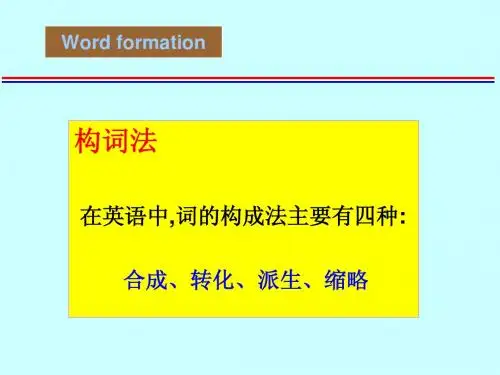
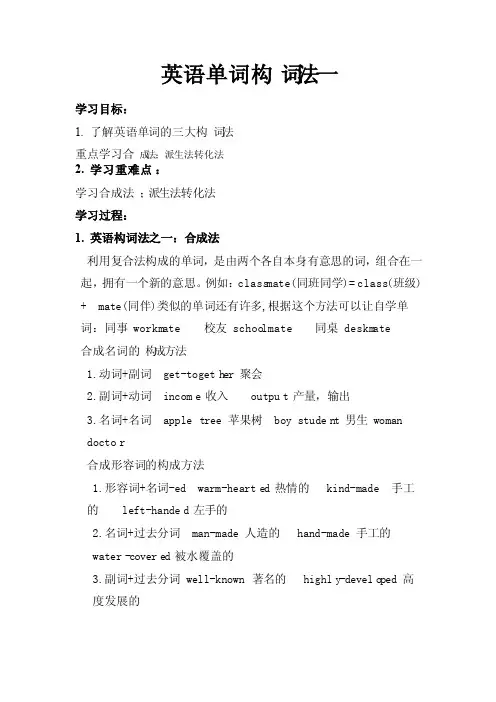
英语单词构词法一学习目标:1.了解英语单词的三大构词法重点学习合成法;派生法转化法2.学习重难点:学习合成法;派生法转化法学习过程:1.英语构词法之一:合成法利用复合法构成的单词,是由两个各自本身有意思的词,组合在一起,拥有一个新的意思。
例如:classm ate(同班同学)= class(班级) + mate(同伴)类似的单词还有许多,根据这个方法可以让自学单词:同事 workma te 校友 school mate同桌 deskma te合成名词的构成方法1.动词+副词 get-togeth er 聚会2.副词+动词 income收入 output产量,输出3.名词+名词 appletree 苹果树 boy studen t 男生 womandoctor合成形容词的构成方法1.形容词+名词-ed warm-hearte d 热情的 kind-made 手工的 left-handed左手的2.名词+过去分词 man-made 人造的 hand-made 手工的water-covere d 被水覆盖的3.副词+过去分词 well-known著名的 highly-develo ped 高度发展的4.形容词+现在分词 good-lookin g 漂亮的 easy-going随和的5. 副词+现在分词 hard-workin g 辛劳的2.英语构词法之二:派生法形象地说“派生法”就是从一个单词引申出另外一个新词。
学生也会发现许多单词加一些词缀就成了另一个词,什么叫词缀呢?1.前缀除少数英语前缀外,前缀一般改变单词的意义,不改变词性;英语后缀一般改变词类,而不引起词义的变化2.后缀后缀通常会改变单词的词性,构成意义相近的其他词性;少数后缀还会改变词义,变为与原来词义相反的新词。
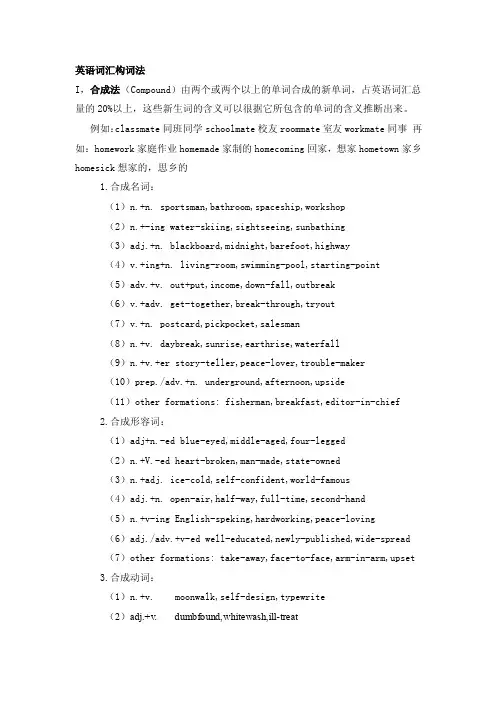
英语词汇构词法I,合成法(Compound)由两个或两个以上的单词合成的新单词,占英语词汇总量的20%以上,这些新生词的含义可以很据它所包含的单词的含义推断出来。
例如:classmate同班同学schoolmate校友roommate室友workmate同事再如:homework家庭作业homemade家制的homecoming回家,想家hometown家乡homesick想家的,思乡的1.合成名词:(1)n.+n. sportsman,bathroom,spaceship,workshop(2)n.+-ing water-skiing,sightseeing,sunbathing(3)adj.+n. blackboard,midnight,barefoot,highway(4)v.+ing+n. living-room,swimming-pool,starting-point(5)adv.+v. out+put,income,down-fall,outbreak(6)v.+adv. get-together,break-through,tryout(7)v.+n. postcard,pickpocket,salesman(8)n.+v. daybreak,sunrise,earthrise,waterfall(9)n.+v.+er story-teller,peace-lover,trouble-maker(10)prep./adv.+n. underground,afternoon,upside(11)other formations: fisherman,breakfast,editor-in-chief2.合成形容词:(1)adj+n.-ed blue-eyed,middle-aged,four-legged(2)n.+V.-ed heart-broken,man-made,state-owned(3)n.+adj. ice-cold,self-confident,world-famous(4)adj.+n. open-air,half-way,full-time,second-hand(5)n.+v-ing English-speking,hardworking,peace-loving(6)adj./adv.+v-ed well-educated,newly-published,wide-spread(7)other formations: take-away,face-to-face,arm-in-arm,upset 3.合成动词:(1)n.+v. moonwalk,self-design,typewrite(2)adj.+v. dumbfound,whitewash,ill-treat(3)adv./prep. + v. overcome,underline,overtake4.合成副词: however, maybe, indoors5.合成代词: himself,everyone,somethingII,转化法(Conversion)单词的词类发生转化,而词形不变。
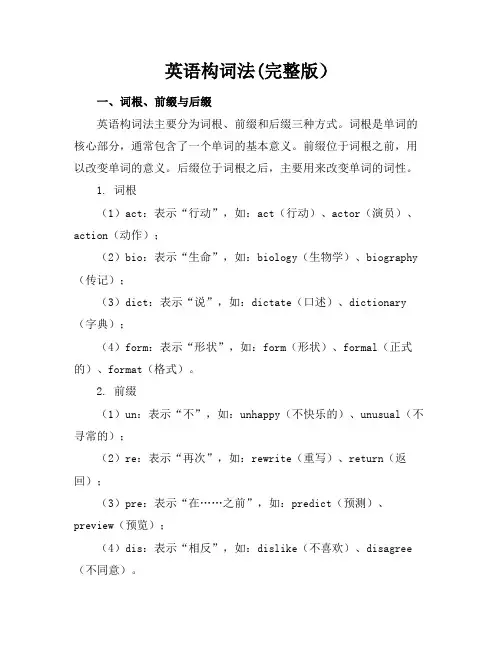
英语构词法(完整版)一、词根、前缀与后缀英语构词法主要分为词根、前缀和后缀三种方式。
词根是单词的核心部分,通常包含了一个单词的基本意义。
前缀位于词根之前,用以改变单词的意义。
后缀位于词根之后,主要用来改变单词的词性。
1. 词根(1)act:表示“行动”,如:act(行动)、actor(演员)、action(动作);(2)bio:表示“生命”,如:biology(生物学)、biography (传记);(3)dict:表示“说”,如:dictate(口述)、dictionary (字典);(4)form:表示“形状”,如:form(形状)、formal(正式的)、format(格式)。
2. 前缀(1)un:表示“不”,如:unhappy(不快乐的)、unusual(不寻常的);(2)re:表示“再次”,如:rewrite(重写)、return(返回);(3)pre:表示“在……之前”,如:predict(预测)、preview(预览);(4)dis:表示“相反”,如:dislike(不喜欢)、disagree (不同意)。
3. 后缀(1)ness:表示“状态”,如:happiness(幸福)、sadness (悲伤);(2)ful:表示“充满”,如:hopeful(充满希望的)、careful(小心翼翼的);(3)ly:表示“副词”,如:quickly(迅速地)、slowly(慢慢地);(4)tion:表示“动作、状态”,如:action(动作)、invention(发明)。
二、合成法与派生法在英语构词法中,除了词根、前缀和后缀,还有合成法和派生法两种重要的构词方式。
这些方法丰富了英语词汇,使得表达更加精确和多样。
1. 合成法(1)名词+名词:如:snowfall(降雪)、bookstore(书店);(2)名词+形容词:如:worldwide(全世界的)、citywide(全市的);(3)形容词+形容词:如:darkblue(深蓝色的)、lightgreen (浅绿色的);(4)动词+副词:如:lookup(查阅)、takeover(接管)。
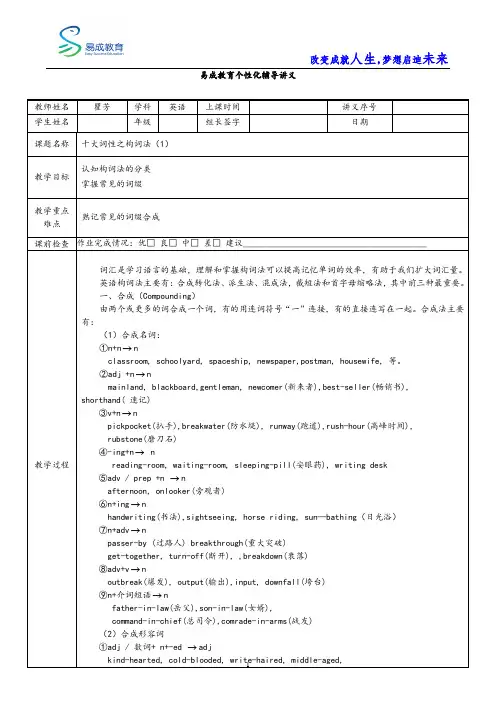
易成教育个性化辅导讲义教师姓名瞿芳学科英语上课时间讲义序号学生姓名年级组长签字日期课题名称十大词性之构词法(1)教学目标认知构词法的分类掌握常见的词缀教学重点难点熟记常见的词缀合成课前检查作业完成情况:优□良□中□差□建议__________________________________________教学过程词汇是学习语言的基础,理解和掌握构词法可以提高记忆单词的效率,有助于我们扩大词汇量。
英语构词法主要有:合成转化法、派生法、混成法,截短法和首字母缩略法,其中前三种最重要。
一、合成(Compounding)由两个或更多的词合成一个词,有的用连词符号“一”连接,有的直接连写在一起。
合成法主要有:(1)合成名词:①n+n→nclassroom, schoolyard, spaceship, newspaper,postman, housewife, 等。
②adj +n→nmainland, blackboard,gentleman, newcomer(新来者),best-seller(畅销书),shorthand( 速记)③v+n→npickpocket(扒手),breakwater(防水堤), runway(跑道),rush-hour(高峰时间),rubstone(磨刀石)④-ing+n→ nreading-room, waiting-room, sleeping-pill(安眼药), writing desk⑤adv / prep +n →nafternoon, onlooker(旁观者)⑥n+ing→nhandwriting(书法),sightseeing, horse riding, sun—bathing(日光浴)⑦n+adv→npasser-by (过路人) breakthrough(重大突破)get-together, turn-off(断开), ,breakdown(衰落)⑧adv+v→noutbreak(爆发), output(输出),input, downfall(垮台)⑨n+介词短语→nfather-in-law(岳父),son-in-law(女婿),command-in-chief(总司令),comrade-in-arms(战友)(2)合成形容词①adj / 数词+ n+-ed →adjone-eyed (独眼的),three-legged②adj+-ing →adjgood-looking (相貌好看的),easy-going(随和的),English-speaking,③adj+n→adjlow-price, high-class(高级的),second-hand(旧的),everyday,large-scale(大规模)④n+adj→adjlifelong(终生的),nationwide(全国性的),worldwide, world-famous,color-blind(色盲的),airsick(晕飞机的)⑤n+ 分词→adjman-made, state-owned(国有的), radio-equipped, sunburned(晒黑的)peace-loving(热爱和平的)fun-loving(爱开玩笑的)⑥adv+分词→adjwell-known, widespread (分布广的),well-informed(消息灵通的),hard-working(勤劳的) Far-reaching(深远的)long-lasting(耐用的)(3)合成动词①adv +v→voverthrow(推翻),undergo(经历),uphold(高举), overhear(无意),output(输出),input,②n+v→vsleep-walk(梦游),daydream(做白日梦),spoonfeed(填鸭式灌输),sun-bathe, mess-produce (大规模生产)③adj+v→vwhitewash(粉刷),blacklist(列入黑名单),dry-salt(干腌), deep-freeze(冷藏)(4)合成副词①adv+adv→advhowever, whenever, moreover(而且), therefore,②adj+adv→adveverywhere, nowhere, somewhere, anywhere,③n+adv→advheadfirst(头朝下),daylong(整天),nightlong(通宵)④adv+n→advdownstairs, upstairs, downhill, inside, westward, upward,(5)合成代词some, any, every, no 可与-thing –one, -body 合成代词,代词宾格(物主代词)+self(selves):something, everything, anyone nobody, yourselves, himself,二、转化( conversion )由一种词类转化成另一种或几种词类1.n→advLet‘s go hand in handPlease hand in your exercise books after classwater:水→浇水 place:地方→放置 land:土地→着陆design:图案→设计 seat:座位→使就座 book:书→预定2.adj→vHer room is clean and tidyShe cleans her room every dayquiet:安静的→使…静 slow:慢的→使慢下来back:后面的→支持,使后退 warm:暖和的→使暖和3.adv→vPlease sit downThe government easily downed(打倒)riot.near:附近地→靠岸 up:向上→抬起, out:在外→赶出further:更进一步地→促进4.v→nHe visited the summer palace yesterdayWe paid a visit to the scientist last weektaste::尝起来→味道 use::使用→用处 fly:飞行→苍蝇:cause:引起→起因 show:显示→节目 guess:猜→猜想:5.adj→nWe are very youngThe cow took good care of her young( 幼畜 )right: 正确的→权利 native:本地的→本地人major:主要的→主修科目fat:肥胖的→脂肪三、派生(derivation)由一个词根加上前缀和(或)后缀构成另一个词。

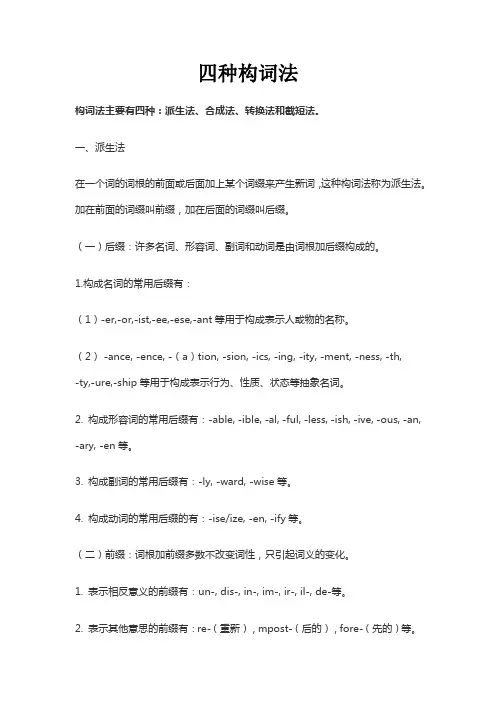
四种构词法构词法主要有四种:派生法、合成法、转换法和截短法。
一、派生法在一个词的词根的前面或后面加上某个词缀来产生新词,这种构词法称为派生法。
加在前面的词缀叫前缀,加在后面的词缀叫后缀。
(一)后缀:许多名词、形容词、副词和动词是由词根加后缀构成的。
1.构成名词的常用后缀有:(1)-er,-or,-ist,-ee,-ese,-ant等用于构成表示人或物的名称。
(2) -ance, -ence, -(a)tion, -sion, -ics, -ing, -ity, -ment, -ness, -th,-ty,-ure,-ship等用于构成表示行为、性质、状态等抽象名词。
2. 构成形容词的常用后缀有:-able, -ible, -al, -ful, -less, -ish, -ive, -ous, -an, -ary, -en等。
3. 构成副词的常用后缀有:-ly, -ward, -wise等。
4. 构成动词的常用后缀的有:-ise/ize, -en, -ify等。
(二)前缀:词根加前缀多数不改变词性,只引起词义的变化。
1. 表示相反意义的前缀有:un-, dis-, in-, im-, ir-, il-, de-等。
2. 表示其他意思的前缀有:re-(重新),mpost-(后的),fore-(先的)等。
二、合成法由两个或两个以上的词合成一个新词,这种构词法称为合成法(compounding)。
合成词之间有的要用连字符连接,有的直接连接在一起。
三、转换法在词行不变的情况下,一个单词由一种词性转换成另一种词性,称为转换(conversion)。
转换后的词义与转换前的词义通常有密切的联系,但有时差异也很大。
有些双音节的词转换后,重音要发生变化。
通常名词重音在前,动词重音在后,有时读音也有不同。
四、截短法即将单词缩写,词义和词性保持不变,主要有截头、去尾、截头去尾等形式。
关于合成法:合成名词:构成方式例词名词+名词weekend周末;名词+动词daybreak黎明;名词+动名词handwriting书法;名词+及物动词+er/or pain-killer止痛药;名词+介词+名词editor-in-chief总编辑;代词+名词she-wolf母狼;动词+名词typewriter打字机。
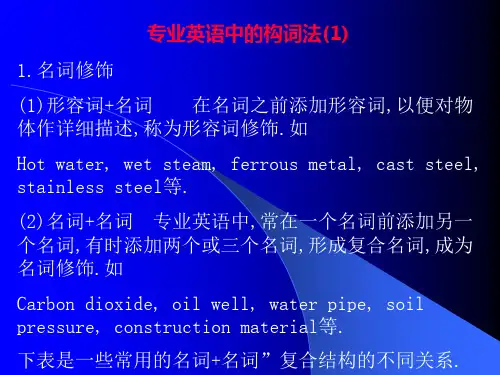
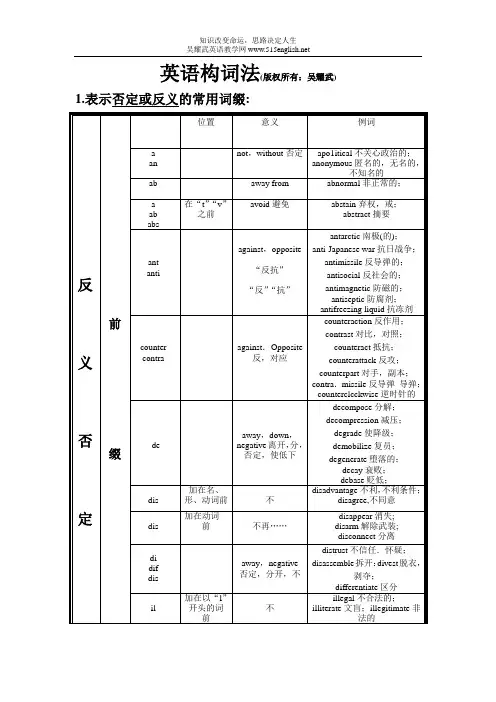
英语构词法(版权所有:吴耀武) 1.表示否定或反义的常用词缀:2.表示时间的常用词缀:3.表示数字的常用词缀:4.动词化常用词缀:5.名词化常用词缀:6.形容词化常用词缀:7.表示属性的常用词缀:8.表示方向、位置的常用词缀:9. 表示程度的常用词缀:10.其他常用词缀词根:阅读难点关键句200句(以包括译文)1. The teacher was not wrong to draw attention to the errors, but if his priorities had centred on the child'sideas, an expression of his disappointment with the presentation would have given the pupil more motivation to seek improvement.2. But it will be the driver's responsibility to make sure that children under 14 do not ride in the front unless they are wearing a seat belt of some kind.3. However, you do not have to wear a seat belt if you are reversing your vehicle; or you are making a localdelivery or collection using a special vehicle; or if you have a valid medical certificate which excuses you from wearing it.4. Remember you may be taken to court for not doing so, and you may be fined if you cannot prove to the court that you have been excused from wearing it.5. Professor Taiju Matsuzawa wanted to find out why otherwise healthy farmers in northern Japan appeared to be losing their ability to think and reason at a relatively early age, and how the process of ageing could he slowed down.6. With a team of colleagues at Tokyo National University, he set about measuring brain volumes of a thousand people of different ages and varying occupations.7. Computer technology enabled the researchers to obtain precise measurements of the volume of the front and side sections of the brain, which relate to intellect (智能)and emotion, and determine the human character.8. Contraction of front and side parts as cells die off was observed in some subjects in their thirties, but it was still not evident in some sixty and seventy-year-olds.9. The findings show in general terms that contraction of the brain begins sooner in people in the country than in the towns.10. White collar workers doing routine work in government offices are, however, as likely to have shrinking brains as the farm worker, bus driver and shop assistant.11. We know that you have a high opinion of the kind of learning taught in your colleges, and that the costs of living of our young men, while with you, would be very expensive to you.12. But you must know that different nations have different ways of looking at things, and you will therefore not be offended if our ideas of this kind of education happen not to be the same as yours. 13. We are, however, not the less obliged by your kind offer, though we refuse to accept it; and, to show our grateful sense of it, if the gentlemen of Virginia will send us a dozen of their sons, we will take care of their education, teach them in all we know , and make men of them.14. In what now seems like the prehistoric times of computer history, the earth's postwar era, there was quite a wide-spread concern that computers would take over the world from man one day.15. Already today, less than forty years later, as computers are relieving us of more and more of the routine tasks in business and in our personal lives. We are faced with a less dramatic but also less foreseen problem.16. Obviously, there would be no point in investing in a computer if you had to check all its answers, but people should also rely on their own internal computers and check the machine when they have the feeling that something has gone wrong.17. Certainly Newton considered some theoretical aspects of it in his writings, but he was reluctant to go to sea to further his work.18. For most people the sea was remote, and with the exception of early intercontinental travellers or others who earned a living from the sea, there was little reason to ask many questions about it , let alone to ask what lay beneath the surface.19. The first time that the question " What is at the bottom of the oceans?" had to be answered with anycommercial consequence was when the laying of a telegraph cable from Europe to America was proposed.20. At the early attempts, the cable failed and when it was taken out for repairs it was found to be covered in living growths, a fact which defied contemporary scientific opinion that there was no life in the deeper parts of the sea.1、老师注重错误没错,但是如果他更注重孩子的思想的话,他失望的表现会使孩子有提高的动力。

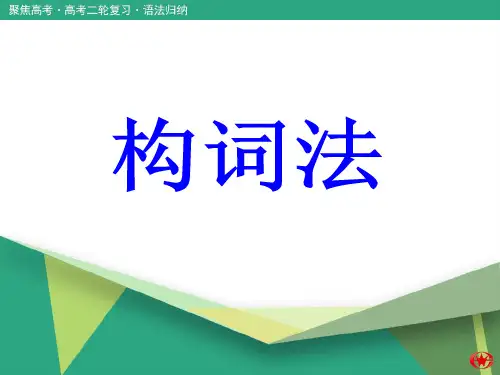
七种构词法及例子一、前缀构词法:前缀构词法是指通过在词根前面加上一个前缀来构成新的词语。
下面是七个例子:1. 重新:表示重新做某事。
例如:重新开始、重新设计。
2. 非:表示否定或相反的意思。
例如:非法、非凡。
3. 反:表示相反的意思。
例如:反对、反弹。
4. 同:表示相同或一起的意思。
例如:同学、同步。
5. 超:表示超过的意思。
例如:超市、超速。
6. 多:表示多个的意思。
例如:多功能、多余。
7. 不:表示否定的意思。
例如:不同、不幸。
二、后缀构词法:后缀构词法是指通过在词根后面加上一个后缀来构成新的词语。
下面是七个例子:1. 化:表示使变成某种状态。
例如:化妆、变化。
2. 人:表示某种身份或职业。
例如:警察、医生。
3. 性:表示某种性质或特征。
例如:性格、个性。
4. 主义:表示某种思想或信仰。
例如:社会主义、共产主义。
5. 区:表示某个地区或范围。
例如:城区、禁区。
6. 家:表示某个家庭或机构。
例如:家庭、公司。
7. 学:表示某种学科或学习的意思。
例如:数学、学习。
三、合成构词法:合成构词法是指通过将两个或多个词根结合在一起形成新的词语。
下面是七个例子:1. 电脑:由“电”和“脑”两个词根组成,表示一种用电做计算的机器。
2. 高速:由“高”和“速”两个词根组成,表示速度很快的意思。
3. 机器人:由“机器”和“人”两个词根组成,表示一种能够模仿人类行为的机器。
4. 电话:由“电”和“话”两个词根组成,表示通过电线传递声音的通信工具。
5. 自行车:由“自行”和“车”两个词根组成,表示人力驱动的两轮交通工具。
6. 火车:由“火”和“车”两个词根组成,表示以蒸汽或电力为动力的铁路交通工具。
7. 地球:由“地”和“球”两个词根组成,表示地球这个星球。
四、转化构词法:转化构词法是指通过改变词性或词类的方式构成新的词语。
下面是七个例子:1. 打:从动词转化为名词,表示击打的动作或声音。
例如:一打、拳打脚踢。
2. 红:从形容词转化为名词,表示红色。
英语构词法1-英语构词法主要有6种一、英语构词法主要有6种:转化、合成、派生、截短、混合、首字母缩合(一)转化法英语构词法中把一种词性用作另一种词性而词形不变的方法叫作转化法,1、动词转化为名词∙I think we‘d better finish the talk now.∙He is a man of strong build.∙Let's have a look first.2、名词转化为动词∙Have you booked the ticket?∙Hand in your papers please.∙She nursed her husband back to health.∙We breakfasted together.3、形容词转化为动词∙We will try our best to better our living conditions.4、副词转化为动词∙Murder will out.恶事终必将败露。
5、形容词转化为名词∙The girl in black appears very beautiful.∙We don't belong to the rich, but we don't belong to the poor either动词----名词stop vt. 停止--- n.车站love vt. 爱--- n. 爱Watch vt. 观看--- n. 手表record vt. 录音--- n. 纪录comb vt. 梳理(头发) --- n. 梳子abuse vt. 辱骂--- n. 辱骂名词---- 动词hand n. 手--- vt. 上交seat n. 座位--- vt. 坐nurse n. 护士--- vt. 护理oil n. 油--- vt. 上油time n. 时间--- vt. 定时,测时shoulder n. 肩膀--- vt. 肩负mine n. 矿山--- vt. 开矿barbecue n. 烧烤---vt. 在烤架上烤ship n. 船--- vt. 用船装运finance n. 金融--- vt. 为……提供资金stain n. 污点,污迹--- vt. 玷污,污染draft n. 草稿--- vt. 起草head n. 头--- v. 前进transport n. 运输--- vt. 运输副词--- 动词down adv. 向下--- v. 放下副词--- 名词nowhere adv. 任何地方都不--- n. 无处,无名的地方形容词--- 名词freezing adj. 冰冻的--- n. 冰点solid adj. 固体的,坚实的--- n. 固体(二)合成 :有两个或更多的词合成一个词。
五种构词法一、联合型1、外在形式:名+名、动+动、形+形联合型的词,外在形式上都是两个表事物、动作或者性状的字,例如“途径”中的“途”和“径”都表示事物,“开关”中的“开”和“关”都表示动作,“寒冷”中的“寒”和“冷”都表示性状。
2、内在逻辑:并列联合型的词,内在逻辑上,两个字之间是并列关系,无主次之分。
语义上,两个字意义意义相同、相近、相关、或相反。
例如“途径”中的“途”和“径”并列,意义相同,都表示“路”,“开关”中的“开”和“关”并列,意义相反,“寒冷”中的“寒”和“冷”并列,意义相关。
二、偏正型1、外在形式:定语+名词状语+动词或形容词偏正型分为定中和状中两种,定中型偏正的外在表现形式为“定语+名词”,也就是其第二个字必定是表示事物的,如“冰箱”;状中型偏正的外在表现形式为“状语+动词或形容词”,也就是其第二个字必定是表示动作或性状的。
如“游击”“火红”。
综上,一个合成词,其第二个字是表示事物、动作或者性状的,其有可能是偏正关系,具体还需要看两个字间的逻辑关系。
2、内在逻辑:修饰限制偏正型的词,内在逻辑上,两个字之间是修饰、限制关系,即第一个字修饰、限制第二个字。
例如“冰箱”,“冰”修饰“箱”,冰的箱;“游击”,“游”修饰“击”,游动地打击;“火红”,“火”修饰“火”,像火一样的红。
三、补充型1、外在形式:动+补语名+量补充型分为动补和量补两种,补充型词的动补外在表现形式为“动+补语”,也就是其第一个字必定是表示动作的,如“推翻”;补充型词的量补外在表现形式为“名+量”,也就是其第一个字表示事物,第二个字是表示该事物的量词,如“书本”。
2、内在逻辑:补充补充型的词,内在逻辑上,两个字之间是补充关系,即第二个字补充说明第一个字。
例如“推翻”,“翻”补充说明“推”,推得怎么样,推翻,类似的还有“提高、改进”等;而量补是较为特殊的,第二个字是第一个字的量词,例如“书本”“马匹”“房间”等。
四、动宾型1、外在形式:动+名动宾型词的外在表现形式为“动+名”,也就是其第一个字必定是表示动作的,第二个字是表示事物的,如“管家”“失业”。
英语基本构词法在语言发展的最初阶段, 人们使用少量的词汇, 如earth地球, man 人, mountain 山, water 水等这些词叫基本词。
随着社会的发展和科学文化的进步, 产生了许多新事物和新概念, 人们便创造出一些新词来表示它们。
按照语言的一定规律创造新词的方法, 叫构词法。
在现代英下面语中构词法主要有派生法、合成法、转化法和缩略法等,主要介绍派生(Derivation) 、合成(Compound)、转化(Conversion) 这三种最主要的方法。
一派生(Derivation)——单词运用的间接转型派生法是给词根添加上前缀或后缀而构词。
如词根sis(立)加上有一定含义的词缀构成的词有:assist(帮助),assistant(助手),insist(坚持),resistless(不抵抗的)等。
又如自由词素work,也称词根词,加缀构成的词有:rework,workable,workless,worker,等。
词根添加派生词缀构成的词叫做派生词(derivatives)。
由此可见词根添加上具有什么词性的词缀,所派生的词就具有什么词性,如-er是名词后缀,worker 就是名词;-less是形容词后缀,resistless就是形容词。
(一) 常见的单词后缀1. 以下单词加后缀构成抽象名词:( 1) -ery, -ry, 表示“性质、场所”等。
如:slavery(奴隶制), nursery( 托儿所) ,bakery( 面包房; 糕点厂) 等。
( 2) -ment 表示“运动; 结果”。
如: development(发展) ,government(政府) , equipment ( 装备),achievement( 成就) 。
( 3) -ness 表示“状态; 性质”。
如: kindness(善良) , darkness( 黑暗) , illness( 疾病) ,carelessness( 粗心) 等。
构词法是指单词形成的方式,英语中有多种构词法。
以下是英语中常见的10种构词法:
1. 前缀(Prefix):
- 通过在词根前添加字母或音节来改变词义,比如un(不)re(再次)等。
2. 后缀(Suffix):
- 通过在词根后添加字母或音节来改变词性或词义,比如-ly(副词后缀)、-able(形容词后缀)等。
3. 派生(Derivation):
- 通过改变词的词根或加入前缀和后缀来形成新词,比如从名词natio 派生而来的形容词national。
4. 复合词(Compound words):
- 由两个或多个词组合而成,保留各自的词义,如sunflower(太阳花)。
5. 缩略词(Abbreviations):
- 由一个或多个词的首字母组成,如UN(联合国)、radar(雷达)。
6. 混成词(Blending):
- 将两个词的部分合并而成,如brunch(早午餐)。
7. 借词(Borrowing):
- 从其他语言中借用的词,如pizza(比萨饼)来自意大利语。
8. 转化(Conversion):
- 通过改变词的词性而形成新词,如将名词email转化为动词to email(发电子邮件)。
9. 派生缩写词(Back-formation):
- 通过删除词中看似后缀的部分,形成新的词,如editor 衍生出edit。
10. 词根词缀组合(Root and Affix Combination):
- 通过词根和词缀的组合形成新词,比如happiness(幸福)中的happy"是词根,-ness 是后缀。
构词法1在英语中,一个单词由一种词性转化为另一种或几种词性而词形不变的方法叫做转化法。
1. 动词转化为名词Let me have a try.让我试试。
They are only allowed to sell soft drinks at school.在学校里只准许他们出售不含酒精的饮料。
2. 名词转化为动词He shouldered his way through the crowd.他用肩膀推开人群前进。
The smell from the kitchen made his mouth water.从厨房传来的气味使他流口水。
3. 形容词转化为动词We will try our best to better our living conditions.我们要尽力改善我们的生活状况。
They tried to perfect the working conditions.他们努力改善工作条件。
4. 形容词转化为名词He didn't know the difference between right and wrong.他不辨是非。
The old in our village are living a happy life.我们村的老年人过着幸福的生活。
5. 形容词转化为副词How long have you lived there?你在那儿住多久了?6.个别词在一定场合中可转化为名词Warm clothes are a must in the mountains.穿暖和的衣服到山区去是必须的。
Life is full of ups and downs.人生有得意时也有失意时。
His argument contains too many ifs and buts.他的辩论中含有太多的“如果”和“但是”。
合成法由两个或两个以上的单词连在一起合成一个新词,这种构词法叫做合成法,合成的词叫做合成词。
合成词一般看其词,知其意。
1. 合成名词名词/代词+名词 newspaper blood-test she-wolf动词+名词 typewriter pickpocket daybreak形容词+名词 greenhouse highway副词+名词 overcoat outside名词+v.-ing/v.-ing +名词handwriting reading-room动词+副词/ 副词+ 动词 breakthrough get-together outbreak outcome名词+介词+名词 sister-in-law editor-in-chief2. 合成形容词名词+形容词/形容词+名词 world-famous duty-free large-scale long- term 副词+形容词 over-anxious evergreen名词+过去分词 man-made sun-burnt名词+现在分词 peace-loving English-speaking形容词+现在分词 good-looking easy-going副词+过去分词 well-informed widespread副词+现在分词 hardworking far-reaching形容词+名词+ed warm-hearted absent-minded数词+名词+ed three-legged ten-storied数词+名词 one-way five–star数词+名词+形容词 ten-year-old 800-meter-long名词+to+名词 face –to-face door - to -door3. 合成动词名词+动词 baby-sit sleepwalk副词+动词 outnumber underestimate overwork形容词+动词 whitewash4. 合成副词形容词+名词 meanwhile anyway形容词+副词 everywhere anyhow副词+副词 however介词+名词 beforehand overhead介词+副词 forever5. 合成代词代词宾格+self/selves herself themselves物主代词+self/selves myself yourselves形容词+名词 anything nothing6. 合成介词副词+名词 inside outside介词+副词 without within副词+介词 into派生法由一个词加上前缀或后缀构成一个与原单词意义相近或截然相反的新词叫做派生法。
1. 前缀除少数前缀外,前缀一般改变单词的意义,但不改变单词的词性。
(1)表示否定意义的前缀un- unhappy unfinished undressdis- disagree disbelievein- [il-,im-,ir-] inaccurate illegal impolite imbalance irregularmis- misbehave mislead mistakenon- nonstop nonsmoker(2)表示其他意义的前缀en- “使……”enrich enlarge encourageinter- “相互”international intercontinentalre- “再,又,重”rethink retell recycletele- “远程的”telescope telephone telegraphauto- “自动的”automatic automobileco- “共同”coworker cooperate coexistanti- “反对,抵抗”antiwar antifreeze antinuclearmulti- “多”multistory multicultural multicolorbi- “双,二”bicycle bilingual bilateralmicro- “极小的,微小的”microwave microcomputerover- “太多,过分”overwork overdo overestimateself- “自己,本身”self-centered self-confident self-controlunder- “在……下面,……下的,不足的”underline, underground, underestimate, underrate2. 后缀(1)形容词后缀-able “可……的,具有……的”acceptable drinkable knowledgeable reasonable -al “与……有关的”physical, magical, political-an “属于某地方的人”American African-ern “方向”southern, northern, eastern-ful/less “(没)有……的”helpful, useful, homeless, hopeless-ish “如……的;有……特征的”foolish childish selfish-ive “有……倾向的”active attractive expensive-en “由……制成的”golden wooden woolen-ous “有(性质)的”famous, da ngerous, poisonous-ly “有……性质的”friendly yearly daily-y “构成形容词”noisy dusty cloudy(2)名词后缀-er / or “表人或用具” farmer, baker, visitor, professor, cooker, container-ese “某国(人)的”Chinese, Japanese-ian “某国、某地人;精通……的人”musician, Asian, Russian, technicia n-ist “某种主义或职业者”physicist, scientist, communist,socialist-ess “表女性,雌性”hostess, actress, princess-ment “行为或其状态”government, movement, achievement-ness “性质,状态”illness, sadness, carelessness-tion “动作,过程,结果”invention, organization, translation-ance/ ence “抽象;行为、性质、状态”importance, appearance, absence, existence-th “性质、情况” depth, warmth, truth-ful “(满的)量”handful, spoonful, mouthful-(a)bility “抽象、性质、状态”possibility, disability, reliability-al “过程、状态”survival, arrival, approval-y “性质、情况”modesty, delivery, honesty-dom “处于……状态;性质”freedom, boredom-age “状态,行为,身份及其结果”courage, storage, marriage(3)动词后缀-fy / ify “使得;变得” simplify, beautify, purify-en “使成为;变得” shorten, deepen, sadden-ize “使成为” apologize, realize, specialize(4)副词后缀-ly “方式,程度” freely, truly, angrily-ward(s) “向……” towards, forward, upwards(5)数词后缀-teen “十几” fourteen, eighteen, thirteen -ty “整十位数” forty, fifty, sixty-th “序数词” twelfth, twentieth。